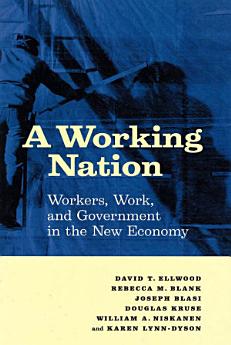A Working Nation: Workers, Work, and Government in the New Economy
David T. Ellwood · Rebecca M. Blank · Joseph Blasi · Douglas Kruse · William A. Niskanen · Karen Lynn-Dyson
Sep 2000 · Russell Sage Foundation
Ebook
168
Pages
reportRatings and reviews aren’t verified Learn More
About this ebook
The nature of work in the United States is changing dramatically, as new technologies, a global economy, and more demanding investors combine to create a far more competitive marketplace. Corporate efforts to respond to these new challenges have yielded mixed results. Headlines about instant millionaires and innovative e-businesses mingle with coverage of increasing job insecurity and record wage gaps between upper management and hourly workers. A Working Nation tracks the profound implications the changing workplace has had for all workers and shows who the real economic winners and losers have been in the past twenty-five years. A Working Nation sorts fact from fiction about the new relationship between workers and firms, and addresses several critical issues: Who are the real winners and losers in this new economy? Has the relationship between workers and firms really been transformed? How have employees become more integrated into or disconnected from corporate strategies and performance? Should government step into this new economic reality and how should it intervene? Among the topics investigated, David T. Ellwood explores and explains the apparent paradox between the steady rise in per capita national income and the stagnant wages of middle- and working-class workers. Douglas Kruse and Joseph Blasi study relative changes in long-term vs. temporary work, and evaluate the introduction of profit-sharing schemes and high performance workplace programs. William A. Niskanen and Rebecca M. Blank, both former members of the president's Council of Economic Advisers, offer their perspectives on what direction government might take to make this a working nation for everyone. Though Niskanen and Blank take alternative approaches, they both conclude that the primary policy emphasis ought to be on the problems of the least skilled more than on inequality per se, and that a focus on childhood education and tax supports for low-income working families should be of primary concern. A Working Nation paints a compelling and surprisingly consistent picture of today's workplace. While the booming economy has created millions of new jobs, it has also lead to an alarmingly unbalanced system of rewards that puts less-skilled, and many middle-class, workers at risk. This book is essential reading for those seeking the most efficient answers to the challenges and opportunities of the evolving economy.
About the author
DAVID T. ELLWOOD is Lucius N. Littauer Professor of Political Economy at the John F. Kennedy School of Government, Harvard University. He is also director of the Aspen Domestic Strategy Group. REBECCA M. BLANK was a member of the Council of Economic Advisers under President Clinton. She is Henry Carter Adams Collegiate Professor of Public Policy, dean of the Gerald R. Ford School of Public Policy, and professor of economics at the University of Michigan. JOSEPH BLASI is professor of sociology at the School of Management and Labor Relations, Rutgers University. DOUGLAS KRUSE is professor of economics at the School of Management and Labor Relations, Rutgers University. He is also research associate of the National Bureau of Economic Research. WILLIAM A. NISKANEN was a member of the Council of Economic Advisers under President Reagan and is chairman of the Cato Institute. KAREN LYNN-DYSON is associate director of the Aspen Institute's Domestic Strategy Group.
Rate this ebook
Tell us what you think.
Reading information
Smartphones and tablets
Install the Google Play Books app for Android and iPad/iPhone. It syncs automatically with your account and allows you to read online or offline wherever you are.
Laptops and computers
You can listen to audiobooks purchased on Google Play using your computer's web browser.
eReaders and other devices
To read on e-ink devices like Kobo eReaders, you'll need to download a file and transfer it to your device. Follow the detailed Help Center instructions to transfer the files to supported eReaders.





